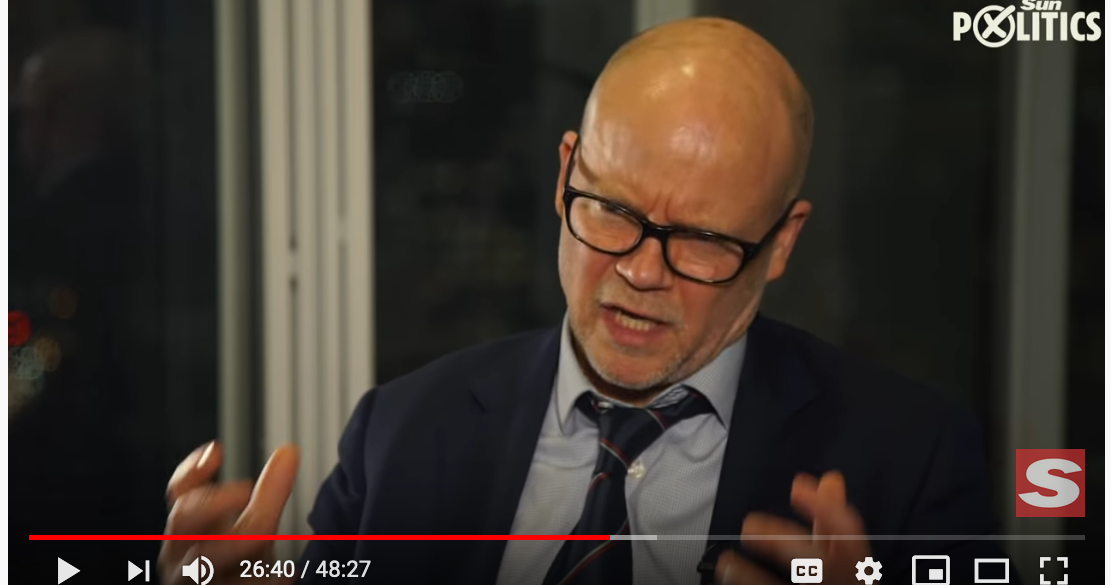Where Toby Young draws the line

In February, Stephen Edginton interviewed Toby Young for The Sun on his new Free Speech Union (FSU), designed to defend victims of “cancel culture” like himself, from a moral crusade that both consider to be threatening decent livelihoods and innocent lives in the UK.
The core question regarding both free speech and hate speech is who is to judge whom? and Young is pressed twice on this by Edginton. The direct answers yield little by way of definition. Young replies: “If you go up to a black person in a shopping centre and scream the ‘n’ word in their face – then that is a direct incitement to violence and that should be unlawful. But I would draw the line where the framers of the first amendment of the American Constitution drew the line – which is, everything is acceptable within the law providing it is not a direct incitement to violence.” Consequently, for him, Boris Johnson’s “letterboxes joke” scarcely qualifies, since “the evidence is extremely threadbare that people reading that joke… would go out and attack burqa-wearing women”.
Both examples are deeply problematic: the first representing racist ‘incitement to violence’ as speech which provokes black violence rather than speech which incites racist attack; and the second aimed somewhere between humourless anti-Muslims and humourless Muslims, with an uncomfortable echo of an earlier humourless response to “Mohammedan cartoons” that did not end well. But the main problem with drawing the line here is that hate speech legislation has moved on considerably in recent decades, and Young’s reply wipes out in one go, for example, the huge edifice of antisemitic speech accusations with which we now live.
A follow-up question on Tommy Robinson’s suitability as an applicant reveals an FSU “statement of values” closer to current criteria: “in the course of making an argument, we encourage our members not to criticise people for their membership of a particular ethnic or religious or gender group”. Young reluctantly concedes that “the direct link” Robinson has “strongly implied… between being a Muslim and being part of a grooming gang… borders on Islamophobia.” Yet, somehow this scruple is overcome, and Robinson is a FSU member within five days .
Meanwhile, “who is to judge” is covered by the Free Speech Union Board of Directors and Advisory Council, whose full list is overwhelmingly white, male and unwoke: “Before deciding whether to go in and bat for somebody, I’ll be consulting those people and it will be a collective decision.”
Some people – one of Edginton’s favourite categories – might enquire no further.
***
But an interesting thing happens when the two of them get onto how to ensure that Conservative ideology has the grip that it truly deserves in the UK – one that properly reflects the considerable electoral successes of the country’s far right.
Throughout the interview, “the left” are held responsible for “the Maoist climate of intolerance sweeping through our institutions, particularly the media, universities, public services, politics ” and “poisoning the quality of discourse in our public square”. Edginton is keen to up the ante further by finding “historical similarities… some would argue” between woke culture and the Communist state, a narrative for which Young supplies a hero in the shape of “Sir Roger Scruton” who “risked his liberty to educate people behind the Iron Curtain”, and is now rightly “showered with honours in Hungary, Poland and Czechoslovakia” for it.
However Young is more intent on broadening the appeal of his ‘Union’, from the defence of individual ideologues to a “crowd-funding and counter-mobbing” mass campaign: “My original thought was to limit the members to anyone who makes a living from communicating ideas. But I have now decided that anyone who even just supports the cause can join.” Nor is this broadening confined to numbers: “Free speech isn’t just for protecting white, heterosexual, cis-gendered, Tory Brexit-supporting males like me. It’s for everybody… and particularly for beleaguered minorities.”
He is soon arguing that not only liberals but also leftwingers need to learn Martin Niemöller’s lesson, that when they come for Jacob Rees-Mogg who was no-platformed at the University of the North West of England, today, they will come for you and even Peter Tatchell, Julie Bindel, Germaine Greer or J.K. Rowling (“who is a pal of Gordon Brown’s”) tomorrow. Armed with his new alliance with “second-generation feminists” Young is hoping, like all good hegemonists, to “position the Overton window more to the centre and make it that little bit less narrow”, all in the name of holding open civilised debate.
Quite why the “Trans Taliban” remain excommunicated is unclear, though it may stem from Young’s conviction that “99% of people would challenge… trans women being women”. But might we look forward to an open discussion between Toby Young and Samir Gandesha, say, on ‘critical thinking’ at university? I hope so.
This piece was originally published in the September edition of Splinters.
tinyurlis.gdu.nuclck.ruulvis.netshrtco.de
